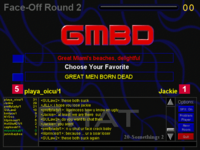
Acrophobia (game)
Encyclopedia

Internet Relay Chat
Internet Relay Chat is a protocol for real-time Internet text messaging or synchronous conferencing. It is mainly designed for group communication in discussion forums, called channels, but also allows one-to-one communication via private message as well as chat and data transfer, including file...
, the game has since been developed into a number of variants: as a download, playable through a browser, via Twitter or through Facebook.
Background
Created by Anthony Shubert in the mid to late 1990s, Acrophobia has similarities to the board game "AcronymbleAcronymble
Acronymble is a board game that came on the market in 1991. It challenges players to create funny acronyms from a random sequence of letters...
," which came on the market in 1991 and 2010 and is produced by Acronymwits Inc.
Game play
Players enter a channel hosted by a botIRC bot
thumb|409px|right|An IRC bot performing a simple task.An IRC bot is a set of scripts or an independent program that connects to Internet Relay Chat as a client, and so appears to other IRC users as another user...
which runs the game. In each round, the bot generates a random acronym. Players compete by racing to create the most coherent or humorous sentence that fits the acronym - in essence, a backronym
Backronym
A backronym or bacronym is a phrase constructed purposely, such that an acronym can be formed to a specific desired word. Backronyms may be invented with serious or humorous intent, or may be a type of false or folk etymology....
. After a set amount of time expires, each player then votes anonymously via the bot for their favorite answer (aside from their own).
Points are awarded to the most popular backronym. Bonus points may be also be given based on the fastest response and for voting for the winning option. Some implementations give the speed bonus to the player with the first answer that received at least one vote; this is to discourage players from quickly entering gibberish just to be the first. Bonus points for voting for the winner helps discourage players from intentionally voting for poor answers to avoid giving votes to answers that might beat their own.
Some versions of the game were criticised for the ease with which players could disrupt games with obscenities, and the anonymous nature of the site meant that there were no repercussions for this behaviour. Usually, nonsense backronyms will score low and the most humorous sounding backronym which effectively makes a sentence from the initials will win. Some rounds may have a specific topic that the answers should fit, although enforcement of the topic depends on solely on the other players' willingness to vote for off-topic answers.
Acrophobia was commended as an online game that showed the potential for educational use, and that its use of technology allowed "imaginative play, instant feedback, and [an] unusual scoring system."
An example game typically goes as follows:
- a 6-letter round
- a 7-letter round
- an 8-letter round
the top two players at this point are chosen to face-off. In the face-off rounds, the two players enter their acronyms and everyone else votes not knowing which acronym is from which player. Each face-off round lasts about 20 seconds and consists of:
- a 3-letter round
- a 4-letter round
- a 5-letter round
The player with the most points from the face-off round wins the game.

